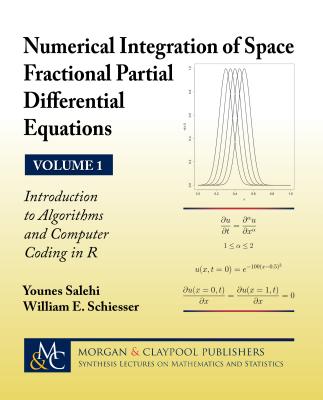
Numerical Integration of Space Fractional Partial Differential Equations: Vol 1 - Introduction to Algorithms and Computer Coding in R
Paperback
Series: Synthesis Lectures on Mathematics and Statistics
CalculusGeneral MathematicsProgramming
Currently unavailable to order
Please enter your email and a message will be sent to you when this product becomes available on our website.
ISBN13: 9781681732077
Publisher: Morgan & Claypool
Published: Nov 27 2017
Pages: 201
Weight: 0.78
Height: 0.43 Width: 7.50 Depth: 9.25
Language: English
1 different editions
Also available
Numerical Integration of Space Fractional Partial Differential Equations: Vol 1 - Introduction to Algorithms and Computer Coding in R
Salehi, Younes
Schiesser, William E.
Paperback
Also in
Calculus
Princeton Review AP Calculus BC Premium Prep, 11th Edition: 5 Practice Tests + Digital Practice Online + Content Review
Khan, David
The Princeton Review
Paperback
AP Calculus Premium, 2025: Prep Book with 12 Practice Tests + Comprehensive Review + Online Practice
Barron's Educational Series
Bock, David
Donovan, Dennis
Paperback
Princeton Review AP Calculus AB Premium Prep, 11th Edition: 8 Practice Tests + Digital Practice Online + Content Review
The Princeton Review
Khan, David
Paperback
Bundle: Calculus: Early Transcendentals, Loose-Leaf Version, 9th + Webassign, Multi-Term Printed Access Card
Clegg, Daniel K.
Watson, Saleem
Stewart, James
Hardcover
Student Solutions Manual, Chapters 1-11 for Stewart/Clegg/Watson's Calculus: Early Transcendentals, 9th
Stewart, James
Clegg, Daniel K.
Watson, Saleem
Paperback
Student Solutions Manual for Stewart's Essential Calculus: Early Transcendentals, 2nd
Stewart, James
Paperback
Princeton Review AP Calculus AB Prep, 10th Edition: 5 Practice Tests + Complete Content Review + Strategies & Techniques
Khan, David
The Princeton Review
Paperback
5 Steps to a 5: 500 AP Calculus Ab/BC Questions to Know by Test Day, Fourth Edition
Anaxos Inc Na
Paperback
Ordinary Differential Equations: An Elementary Textbook for Students of Mathematics, Engineering, and the Sciences
Tenenbaum, Morris
Pollard, Harry
Paperback
Elements of the Theory of Functions and Functional Analysis [Two Volumes in One]
Fomin, S. V.
Kolmogorov, A. N.
Paperback
Mathematics: Its Content, Methods and Meaning
Lavrent'ev, M. a.
Aleksandrov, A. D.
Kolmogorov, A. N.
Paperback
Single Variable Calculus: Early Transcendentals
Stewart, James
Watson, Saleem
Clegg, Daniel K.
Hardcover
The Fractional Calculus: Theory and Applications of Differentiation and Integration to Arbitrary Order
Oldham, Keith B.
Spanier, Jerome
Paperback
A History of Vector Analysis: The Evolution of the Idea of a Vectorial System
Crowe, Michael J.
Paperback
Integral, Measure and Derivative: A Unified Approach
Mathematics
Shilov, G. E.
Gurevich, B. L.
Paperback
Problems in Differential Calculus - Supplementary to a Treatise on Differential Calculus
Byerly, William Elwood
Paperback
Methods of the Theory of Functions of Many Complex Variables
Vladimirov, Vasiliy Sergeyevich
Paperback
Pre-Calculus: 1001 Practice Problems for Dummies (+ Free Online Practice)
Sterling, Mary Jane
Paperback
AP Calculus Premium, 2026: Prep Book with 12 Practice Tests + Comprehensive Review + Online Practice
Bock, David
Donovan, Dennis
Barron's Educational Series
Paperback
Schaum's Outline of Complex Variables, 2ed
Lipschutz, Seymour
Schiller, John J.
Spiegel, Murray R.
Paperback
Calculus On Manifolds: A Modern Approach To Classical Theorems Of Advanced Calculus
Spivak, Michael
Paperback
Linear and Nonlinear Functional Analysis with Applications: With 401 Problems and 52 Figures
Ciarlet, Philippe G.
Hardcover
Math education workbook: Daily Mathematics Practice Exercises Maths book level 2 for 3rd 4th 5th... Grades with Addition, Subtraction, Multipli
Homeschooling Book, Math
Paperback
Math for Programmers: 3D Graphics, Machine Learning, and Simulations with Python
Orland, Paul
Paperback
Schaum's Outline of Mathematical Methods for Business, Economics and Finance, Second Edition
Moises Pena-Levano, Luis
Paperback
Math for Deep Learning: What You Need to Know to Understand Neural Networks
Kneusel, Ronald T.
Paperback
Math education workbook: Math education workbook: Daily Mathematics Practice Exercises Maths book level 3 for 3rd 4th 5th... Grades with Additi
Homeschooling Book, Math
Paperback
Schaum's Outline of Fourier Analysis with Applications to Boundary Value Problems
Spiegel, Murray R.
Paperback
Math education workbook: Daily Mathematics Practice Exercises Maths book level 1 for 3rd 4th 5th... Grades with Addition, Subtraction, Multipli
Homeschooling Book, Math
Paperback
The Calculus of Friendship: What a Teacher and a Student Learned about Life While Corresponding about Math
Strogatz, Steven
Paperback
Foundations of Analysis: The Arithmetic of Whole, Rational, Irrational and Complex Numbers
Landau, Edmund
Paperback
MIT Integration Bee, Solutions of Qualifying Tests from 2010 to 2023: 249 pages, 15 chapters.
Alkousa, Mohammad
Paperback
Finite-Dimensional Linear Analysis: A Systematic Presentation in Problem Form
Glazman, I. M.
Ljubic, Ju I.
Paperback
Pre-Calculus Equations & Answers: A Quickstudy Laminated Reference Guide
Expolog LLC
Yablonski, Ken
Other
Bundle: Calculus, Loose-Leaf Version, 9th + Webassign, Multi-Term Printed Access Card
Watson, Saleem
Stewart, James
Clegg, Daniel K.
Hardcover
Student Solutions Manual for Calculus for Biology and Medicine
Neuhauser, Claudia
Roper, Marcus
Paperback
The Calculus of Happiness: How a Mathematical Approach to Life Adds Up to Health, Wealth, and Love
Fernandez, Oscar E.
Paperback
Ap(r) Calculus AB & BC Crash Course 3rd Ed., Book + Online: Get a Higher Score in Less Time
Banu, Flavia
Rosebush, J.
Paperback


 Sign-In
Sign-In Cart
Cart